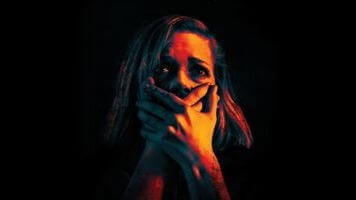Don’t Breathe during this tense thriller from the maker of the new Evil Dead

“Just because he’s blind, it doesn’t mean he’s a fucking saint, bro.” So says tattooed burglar Money (Daniel Zovatto) to his teenaged accomplices while casing the home of some lonely, sightless old man they’re planning to rip off. Money won’t know the half of it, though, until the three have broken in and discovered that their mark is no helpless geriatric, but a merciless military veteran whose loss of vision hasn’t entirely diminished his skills as a killing machine. Half a century after Wait Until Dark pitted a blind Audrey Hepburn against the three crooks trying to get into her apartment, along comes Don’t Breathe to successfully invert its scenario. This time, the criminals are the terrified good guys, hiding in plain sight from a madman they shouldn’t have crossed. Their main obstacles: creaky floorboards, narrow hallways, and the telltale giveaway of their own ragged, unsuppressed breathing.
It’s an ingenious way to subvert the rules of the home-invasion thriller, and a significant pivot for director Fede Alvarez, whose Evil Dead remake relied more on gallons of gore (literally—that film has the record for most fake blood ever brought onto a set) than expert suspense. With Don’t Breathe, Alvarez learns to trust the primal intensity of his premise. The film wastes no more than maybe 15 minutes getting Money; his girlfriend, Rocky (Jane Levy); and her careful, friend-zoned companion, Alex (Dylan Minnette), inside the heavily barricaded house. Taking a page from James Wan’s playbook, Alvarez glides his steadicam around every nook and cranny of the property, giving us the whole layout of the space. That way, when the shit hits the fan, we know exactly how far the characters are from each other and from freedom.
Don’t Breathe plays a little fast and loose with the abilities of its villain. One minute he’s realistically impaired, to the point where one of the kids can sidle past him undetected or dodge his blows during a hand-to-hand encounter. The next, he’s making more like the sensorily heightened Daredevil, echolocating his prey in the dark and figuring out their numbers by sniffing out their removed shoes. Mostly, the character’s blindness is a device—a way for Alvarez to toy with genre conventions and find unique pathways to tension. Which isn’t to say he’s not a character, too. Stephen Lang, from Avatar and its forthcoming sequels, makes him a frighteningly human monster—a man hardened by rage at his circumstances and whose grief over a past trauma has calcified into madness. The film even flirts with empathy for him. After all, to a solitary soldier, living alone in the dark, our intruding heroes basically are faceless foes.
But is Don’t Breathe about anything, beyond its unrelenting thrills? Alvarez and his co-writer, Rodo Sayagues, set the film in an economically depressed Detroit, and it’s possible to view the life-and-death showdown they orchestrate as a metaphor for the way a rigged system pits desperate people against each other. (The kids see breaking and entering as a way out of poverty, while the old man’s motives hinge on how the wealthy can buy their way out of consequences.) There’s also the faint, darkly comic impression of some higher power pulling strings: “There is no God,” Lang croaks at one point, but every cruel twist of fate implies otherwise, as does the striking opening shot—a slow, predatory push in from the heavens. Still, nothing interferes with the film’s main purpose, which is to put an electric razor to your nerve endings. Once the action begins in earnest, it never lets up, as Don’t Breathe drags cracking glass, a ferocious dog, and the scariest pitch-black set piece since Silence Of The Lambs into its house of horrors. It leaves the audience in the same place as the characters: gasping for air.